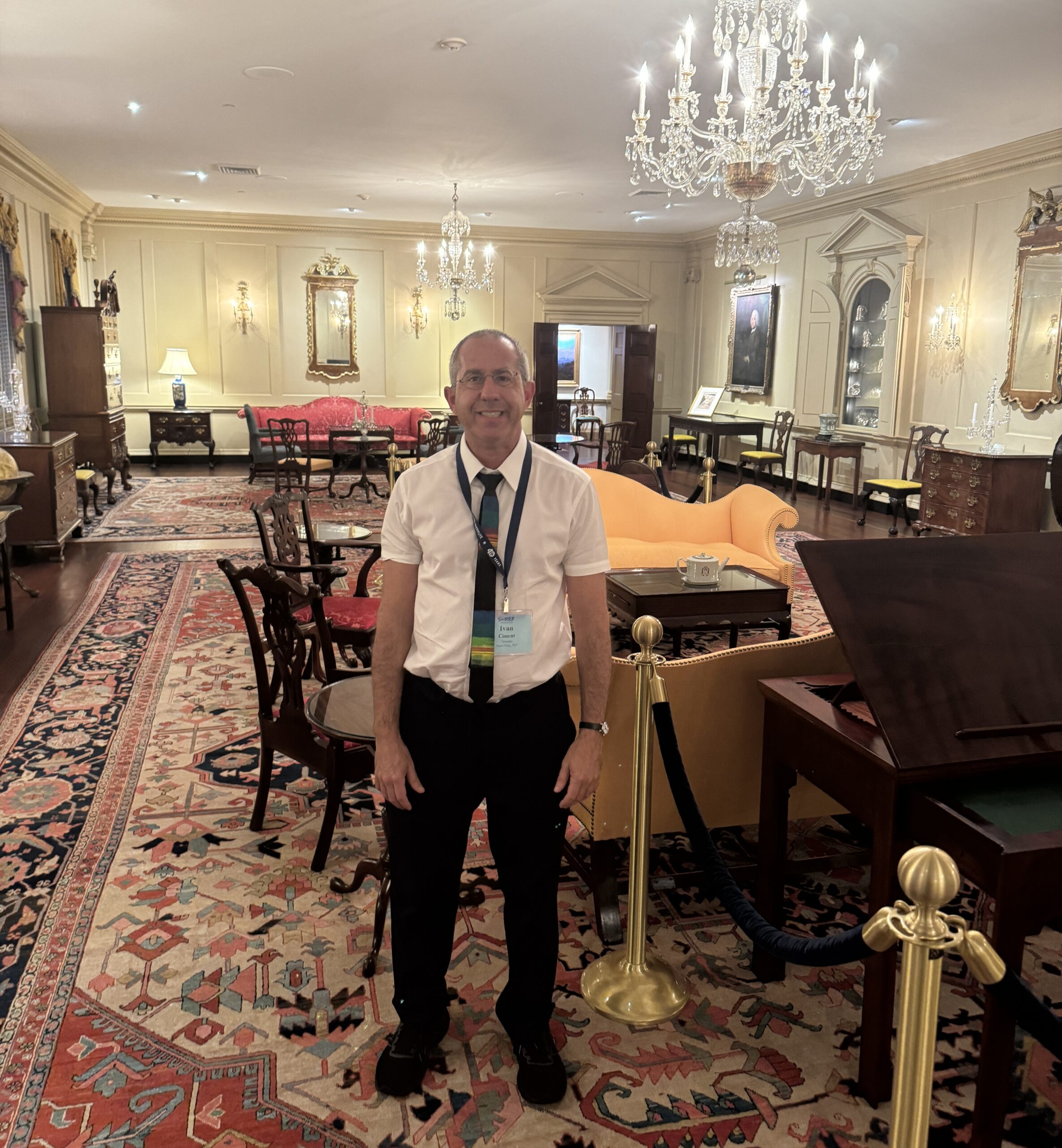
Jeremy won the award at day camp for the person most likely to win the lottery — and lose his ticket.
Over the past 5 months here in Miami, I at least learned how to do decent BBQ. The hardest part to me was getting the fire going in the first place. It would just keep going out before the charcoal burned. They have these bags of charcoal where you just put the whole bag in the BBQ and then just light the bag. It works pretty well. Kingsford produces the product.
So now that you’ve been cooped up inside your country for the past half year or so, where is that special spot you hope to return to somewhere on the planet that makes you feel especially good? That crossroad that brings you memories of all the times you’ve been there before, where you can take stock of how your life has progressed through the years, and that for some reason feels like your home away from home where you check in every once in a while. For me, that spot is the small park in front of the Globes department store in Zurich just off the Bahnhofstrasse. What’s your special place?
A small victory – Jeremy was intrigued by a cover headline about an Economist editorial supporting the inclusion of Fortnight as an Olympic sport. I suggested he read it. He did and he remembered all the details. So I now have both of my kids seeking out things in the Economist. I was brought up with print newspapers and magazines around me and I think it makes a huge difference when kids see the stuff around them. It’s like vegetables – keep putting them on the table and they start eating it. This month alone Jeremy decided he liked Karen’s salmon burgers and meatballs more than he realized before. We think he’s starting to get a bit taller too. At least that is what others are telling us.
Does it ever happen to you that you want to share a song you like with your kids and they say it’s ancient, although it’s from the 1970’s. But then they come to you with a new song that they recognize from a recent movie or their summer camp and it turns out to be a song from the 1970’s, perhaps even the original recording. Irving Berlin once said that in reality there are only 5 songs. It’s like clothes; eventually everything comes back into fashion. But old movies are different; kids can’t stand watching movies that I thought looked great in the 70’s and 80’s.
To please my father who said I needed to watch a Real News program, I agreed to watch an hour of Sean Hannity on Fox News Channel. (OK, OK. I hear you.) I have to wonder if he really believes what he is saying on the TV or if it is all just a big act on his part. One day we’ll be told that it was all just a great gig on Fox. They are actually winning in prime time ratings with this stuff. You can call Hannity a lot of things but it is clearly an opinion program; It’s not a news program at least as I know it. The show I watched was called “Violence in America’s Democratic Run Cities” and for an hour we were told that America is going to the dogs, and the end is near if Pelosi, Schumer and the “Forgotten One” win in November. You know who, the presidential candidate with dementia. What I found insane was Hannity was trying to paint the Democrats as a white supremacist party including what he called KKK Robert Byrd of West Virginia versus the GOP under Trump which he says has done more for Black people than anyone else.
I’m old enough to remember the now-deceased Robert Byrd who more than 50 years ago was a member of the KKK, but he changed his stripes and became a well-respected leader in Congress. Lots of people in that era changed over the years and went on to illustrious political careers; the Republicans might want to be reminded of Strum Thurmond of South Carolina. It’s just ridiculous to build a case around Robert Byrd as if he were out there right now burning crosses in Alabama. You can’t call that news. It’s opinion and it’s really dishonest opinion at that. That’s what I mean when I say that Fox is really not doing the nation any service; it’s just putting up people who want to blather on and on and sow division and rake in advertising dollars by appealing to elderly and uneducated white men who have enough time on their hands to vote and who are motivated more by being against something than being in favor of anything. What bothers me is that Fox is appealing to those with the least amount of stake in the country’s future. Senior citizens don’t really care about the future of climate change. and uneducated unemployed people are not going to be paying much taxes or creating much growth for the country. But if they all run out and vote, it creates a mess for the rest of us. . Over half the kids under age 16 in the US are not white according to a study from the Brookings Institution cited in the New York Times; as I’ve said, change is coming to the US and old white men are fighting like hell to prevent it but you can’t fight Mother Nature.
So now it’s about the Post Office. If I were Biden, I would announce that if Trump wants to neuter the post office and play hokey with the national census, I will make an executive order prolonging the census into 2021 so that it can be done fairly. Trump and the Republicans would either have to stand down from trying to rig the election in their favor or get with the program.
One thing I am concerned about with Trump is the possibility of a scorched earth policy when he leaves office to ensure that Biden has a horrible time reversing what he did. When Trump entered office, he had an irrational desire to undo anything with Obama’s fingerprints on it and is now attempting to sabotage efforts to do that to him after he leaves office. For instance, the US ambassador to Israel is selling the ambassador’s residential property near Tel Aviv to make it harder to move the embassy back to Tel Aviv from Jerusalem. That might be a microcosm of what is to come. That home is expected to sell for $87 million and it is a teardown property at this point; the value is the view from the sea of Herzliya. Russian oligarchs: take a number and get in line. Trump is also taking big steps against China to raise the ante in a cold war he wants to put into a freezer.
So you want to know my take on Kamala Harris as VP? She was not my first choice; Tammy Duckworth was but I understand she wasn’t born in the US and a few appeals to Republican judges might have kept her off the ballot in several states while they duked this out in court. I did not like Harris in the debates but I saw her earlier this summer on the Colbert late night show and found her surprisingly watchable. I have no doubt that she is qualified and will be an asset to Biden. She now seems fine to me and sufficiently vague so as to at least not offend various constituencies within the Democratic tent. Moderates could warm to her as long as they don’t mind that she is black. I really emotionally like the fact that in America you can have immigrant Jamaican and Indian parents and run on a presidential ticket. To me that is the uniqueness of what our country offers the world. It’s always supposed to be the idea that anyone could grow up to be president. Donald Trump did after all. So did Barack Obama. At least Joe Biden offers a sense of return to a quieter more stable normal in the executive branch of government which sorely needs more professionals and apolitical career public servants such as in the State Department
I heard an interesting briefing on the future of warfare and I thought the comments of Michael Eizenstadt of the Washington Institute were of more than casual interest. He said that the US only wants to solve problems around the world; if the problem is not solvable, the US wants to stay away. An example of this was Syria under Obama; he thought he could not win there so he stayed out. The Russians, with very little investment, advanced their position very well in that arena. So too he says the US should change its aims in the world to trying to advance its interests in incremental ways instead of trying to solve big problems. We are in a world where others are filling the voids that are being created because we are allowing the perfect to become the enemy of the good.

Another consideration he raises concerns what is known as the Gray Zone of Warfare. Fighting in the gray zone basically means you are fighting covertly and don’t publicly state when you do something. Israel for example fights mainly in the gray zone in Syria. Eizenstadt recommends that the US do more in the gray zone with regard to Iran. Killing Suleimani and taking credit for it created a lot of problems for the US and it would retain more flexibility if it kept its mouth shut. The Iranians manage to constantly provoke without triggering serious repercussions because they stay in the gray zone. He says the Americans either want a state of war or peace and are not comfortable with the in-between with its military. He says that the Americans need to be more flexible and in return they could act more flexibly on the global chess board. The Russians have certainly done this with their attempts to interfere with American elections. We still don’t really know the full extent of what the Russians did in 2016; it may be another 20 years before we find out what they did. However, indications are that they did more than is publicly known and are capable of doing more than they actually did, something that scared Obama who could see what they were doing in 2016 but was afraid to retaliate for fear of escalation, according to an interesting new book I read called Rigged: America, Russia, and 100 years of Covert Electoral Interference by David Shimer. He states that Russia is doing basically what they have done for the past half century and what America used to do in terms of interfering in other countries’ elections, but that the Russians have modified their methods for the internet with stunning success while the Americans have mostly stopped trying to influence elections. He generally concludes that a lot of what winds up on Fox News and other sources with extensive influence originates with Russian disinformation programs aimed at sowing division and confusion in the West.
Speaking of fighting in the gray zone, there was an interesting op-ed on Ynet about the fact that since 2015, the Israelis and Hezbullah have played this game of attacking each other but miraculously over 5 years, nobody has ever gotten killed on either side. The author surmises and cites evidence that the two sides are doing a bit of a kabuki dance meant to satisfy their respective populations that a threat exists and that they are fighting each other, but in truth, the two sides are coordinating these rounds of engagement and the goal is for nobody to get hurt. As an example, he cites an incident where a helicopter with supposedly injured Israeli soldiers lands at Haifa Hospital and they all run out perfectly fine. To some extent, you have the same going on between Iran and the American military just now. The Iranians intentionally miss their target or give several hours warning before firing on a target, and the Americans hit empty buildings in the middle of the night in response.
Here is a rundown of the situation in the Middle East with regard to Israel. As they see it, they and their neighbors are all reeling from economic crisis from the pandemic. Iran has cut aid to Hezbullah and Lebanon is not going to get any US aid or aid from international institutions it controls as long as Hezbullah is pulling strings behind its nominal government. That of course is a serious problem given the latest destruction to hit Beirut. Russia is hurting financially and Syria is bankrupt so both would like to see reduced expenditures in Syria. Having Iran operate within Syria increases the temperature in the area with Israel striking hard (and with Russia not interfering), so Russia wouldn’t mind seeing the Iranians leave the theater. Given the above and other points, Hezbullah would not like a war with Israel at this time. Other points include heavy losses in Syria and the fact that their newer soldiers are more like mercenaries and less motivated elite fighters they used to have in their militia. I would expect pressure to grow on Hezbullah to get out of Lebanon after the port disaster, given that Hezbullah controlled the port. It’s interesting that people in both Lebanon and Israel are demonstrating against corrupt governments, but that it is really hard to change the status quo in either country.
For all the talk of annexation, few in Israel or in the Likud actually want it at this time given the focus on Covid. Netanyahu wasted a lot of bandwidth on annexation for the months of May and June only to see a resurgence of the pandemic. The Palestinians have made no plans for the day after annexation and their leaders have not been able to get people to go into the streets to demonstrate against it. People are just preoccupied right now. Israel’s current coalition government is bloated with about 35 ministries and complete dysfunction with quarrels about every conceivable thing; the government will not last a year. Benny Gantz has reduced himself to a zero as a result of accepting coalition conditions offered by Netanyahu and by his own indecisiveness in his current role. Ehud Yaari, a top-level strategic commentator in the country, says to look at Gadi Eizenkot, former chief of staff of the country’s military, as a possible contender a year from now. Right now, there is a lot of economic pain in the country and people are tired of Netanyahu but so far there is no good alternative.
 As to the Palestinians, I am being told that the Palestinian leadership is in complete disarray and distrustful of each other and that there is no game plan what happens the day after Abbas is gone. Like mafiosos, they make deals in the morning and break them in the evenings, I am told. Either they will appoint the weakest possible person who will leave the rest of them open to game-playing or there will be a triumvirate of people angling to each take the whole pot of power for himself. Whoever inherits Abbas’s position will not be in an enviable job. Meanwhile, polling of Palestinians shows that support for a two-state solution is at an all-time historic low. People figure it will never happen so they figure we might as well hold on to our dream of a one-state solution from Mediterranean Sea to Jordan River. Israelis are also not interested anymore in a two-state solution figuring they can have it all for themselves and keep the Palestinians in a box forever. These views are primarily among the younger people who have only experienced what they have witnessed which is a kabuki dance by both sides and noticing their leaders on both sides are corrupt and rich, feeding them with a lot of cynicism. Other points I’ve been told about Palestinian public opinion from a top regional pollster: East Jerusalemites have become more radical over the past 5 years; people under 30 are more militant; within the West Bank and Gaza, each province wants the other to fight Israel but they themselves don’t want to fight because they fear the consequences; the man in the street is more moderate than the elites and those in the government; people in the street don’t trust their leadership to lead an uprising; people are generally more militant toward the long term and practical in the short term, meaning they view a Palestinian state in a 2-state situation as an interim step toward a Palestinian from Sea to Sea and that this interim step would not end the conflict, but meanwhile they would like economic cooperation with Israel and jobs in Israel. Surprisingly, a strong majority of Palestinians – two-thirds — think their government should not pay salaries to families of prisoners held by Israel. Go figure.
As to the Palestinians, I am being told that the Palestinian leadership is in complete disarray and distrustful of each other and that there is no game plan what happens the day after Abbas is gone. Like mafiosos, they make deals in the morning and break them in the evenings, I am told. Either they will appoint the weakest possible person who will leave the rest of them open to game-playing or there will be a triumvirate of people angling to each take the whole pot of power for himself. Whoever inherits Abbas’s position will not be in an enviable job. Meanwhile, polling of Palestinians shows that support for a two-state solution is at an all-time historic low. People figure it will never happen so they figure we might as well hold on to our dream of a one-state solution from Mediterranean Sea to Jordan River. Israelis are also not interested anymore in a two-state solution figuring they can have it all for themselves and keep the Palestinians in a box forever. These views are primarily among the younger people who have only experienced what they have witnessed which is a kabuki dance by both sides and noticing their leaders on both sides are corrupt and rich, feeding them with a lot of cynicism. Other points I’ve been told about Palestinian public opinion from a top regional pollster: East Jerusalemites have become more radical over the past 5 years; people under 30 are more militant; within the West Bank and Gaza, each province wants the other to fight Israel but they themselves don’t want to fight because they fear the consequences; the man in the street is more moderate than the elites and those in the government; people in the street don’t trust their leadership to lead an uprising; people are generally more militant toward the long term and practical in the short term, meaning they view a Palestinian state in a 2-state situation as an interim step toward a Palestinian from Sea to Sea and that this interim step would not end the conflict, but meanwhile they would like economic cooperation with Israel and jobs in Israel. Surprisingly, a strong majority of Palestinians – two-thirds — think their government should not pay salaries to families of prisoners held by Israel. Go figure.
Peter Beinart’s recent NY Times op-ed proposing a one-state solution should be taken for what it is; one man’s opinion. I’m sure his recent op-ed piece got a lot of press but it represents a far-out view that has hardly any support among the broader Jewish community anywhere. The wookies at the NY Times agree with him and gave him a soapbox to publicize a Jew stating that he no longer believes in a Jewish state. I know Mr. Beinart and I don’t think he is malicious or idiotic; I just don’t agree with him on this one and he is not the only brilliant person out there with hare-brained ideas.
So into this space comes a deal between the US, Israel and the UAE to trade annexation for diplomatic relations. Everybody wins in this regard, even the Palestinians who otherwise were facing annexation and doing virtually nothing to stop it. When you consider that Israel’s spymaster chief was flying this month on a private plane to Qatar to ask them not to stop funding Hamas in Gaza, you know that nothing is as it seems. In this case, what the UAE is really getting out of this deal is arms they want to buy from the US that they could not get under a law that says that Israel’s qualitative edge must be maintained as to those countries still in a state of war with it. 80% of public opinion in the UAE is against normalization of ties with Israel; the rulers of the UAE don’t care all that much about that but I wouldn’t expect to see high profile things involving Israel inside the UAE anytime soon after the initial euphoria wears off.
A random thought: Progressive Democrats have been doing pretty well running against well established pro-Israel incumbents in their party. Pro-Israel PAC’s threw a lot of money at these races late in the campaigns when it became clear the progressives might win. It didn’t help. The progressives won by large amounts. This year it was 4-0 in races of this category. What you can learn from this is (1) pro-Israel money in politics ain’t what it used to be; and (2) if you want to influence a race these days, throwing a lot of money toward the end of the race is not very helpful. Early money counts for more.
Poor Lebanon; I don’t want anyone to say that I know anything, but if 20 years from now it turned out that Israel blew up the munitions there I wouldn’t be surprised. This recent event is likely to put a great deal of pressure on Hezbullah to get off centerstage in Lebanon. They were running that port. If the Israelis were known to have done this, it would be an act of war. But if it turns out to lead to a better Lebanon it was an ingenious idea wherever it came from. I do believe that evidence shows this was not an accident. Seismologist data shows that there were 6 explosions 11 seconds apart before the huge blast occurred. We’ll never know for sure what happened, but any way you slice it, this may be the kick in the ass Lebanon needs to get going in a different direction. What it’s been doing up till now hasn’t worked.
A lot is being written about how Biden might have an opening to get a lot done. If the Democrats take over a majority of the Senate, they may move to get rid of the filibuster, which seems to be becoming inevitable, in order to make it possible to pass legislation with a simple minority rather than with a 61 vote margin. Both Democrats and Republicans in the Senate for the past generation have become frustrated seeing majorities not being able to get their way because the Senate allows minorities to stop almost anything the majority proposes. The crescendo of tribalism has made it so hard to cooperate across the aisle that instead of trying to work together to solve problems each side is trying to steamroll the other. The nation’s policy changes every time control of the Senate flips. This is not the way to get important things done because America and the world looking to America need consistency and long-term planning.
I’ve never felt this is the best way to get long term things done but maybe this will force the sides to try and cooperate more knowing that a small minority cannot block everything. Or it will make things worse with small majorities winning tactical battles and losing the war as legislative initiatives constantly get reversed. It will be up to the Democrats to push for moderate legislation with a good chance of bipartisan support rather than try to drive up the left lane brining along their progressive base and alienating everyone else. It was the middle of the roadsters that gave the Democrats a good showing in 2018 and aside from some loud voices on the left, it will be the same they need in 2020. I recently read a biography about Pelosi called “Pelosi” and she seems rather good at knowing how to count votes and to go for incremental change items even if her own opinions align more so with the far left. I am optimistic that this virus will force real change into America and give added impetus for the two mainstream parties to work together especially once the Republicans purge their ranks of the Trumpists and reassert its middle. For instance, this year the Democrats have detailed plans as to legislation they want to pass next year on various issues. Last time they took over the reins of the legislative and executive branches, they only had plans for the health insurance act. They have a lot of policy people preparing for action and one thing I think they will get is a public option for health insurance. It won’t be universal insurance or Medicare for All because the private option will still exist, but at least people will have a public option if they want it. It makes sense to me and it will probably happen.

There is a debate within the world of journalism as to the concept of objectivity. It’s been going on for a long time but now it is especially urgent. There is no such thing as objectivity, it is said. So it is OK to have a point of view, especially if it is the “right one.” Presenting both sides of a story is a waste if the other side is invalid. For instance, do you have to present a Nazi’s view that the Holocaust is a myth when doing a story about the Holocaust? This is an extreme example just to make it obvious, but there is a lot of in-between. But if you try hard enough you can pin “racist” or some other conversation stopper on almost any point of view. I have a big problem with this because we live in a society where having a point of view increasingly means negating the other’s point of view. Even some liberals are finding that this new wave of “cancelling” speech is suffocating. I agree that there is no such thing as true objectivity – we all bring biases to the table, and many of them are those we don’t realize we have. Others based on their experiences looking in from the outside can notice them and bring them to our attention. For instance, many things that can be perceived as bias or racially tinged are part of everyday speech that hardly anyone realizes stems from bigotry such as the term “peanut gallery” as in “Are there any questions from the peanut gallery?” The problem here is that you can turn almost anything into something that is censorable if you try hard enough as I said before. People have to find a golden mean and distinguish between trying to counter people intending to be hateful as opposed to living with speech that is inconvenient to their taste. For instance, when is a demonstration a riot? Some refuse to call anything a riot. Others feel there is a fine line between the two. Put another way, you can always find some cleric to find a source that he will interpret to prohibit something that otherwise might be left to be permissible. The ideologue might call you a racist for disagreeing with his right to cancel something as racist, but he would be dead set against a rabbi using the same type of logic to prohibit a certain activity.
I think that the journalist’s creed is to be fair in reporting what happens and to try to tell the truth as best he or she perceives You can leave it to the reader to decide if he or she trusts the writer and editor. I know, for example, that the New York Times has a huge fact-checking operation to be sure that things they write are based on credible sources so I tend to trust the facts of their reporting but I might argue with the context or conclusion they reach, certainly on the editorial page where they don’t have to use all the facts to prove a point (and often ignore facts they don’t like). But to be a discerning reader is hard work and not everyone has the means to sift through this stuff and figure things out.
A big problem today in the world is that most people do not trust what they read or see in the news and therefore they believe nothing. It’s an easy way out of this conundrum. The problem with that is that if everything is “truthiness” but there is no truth, then nobody knows what to believe. A democratic society cannot participate if they can’t form an opinion from the same set of facts. Nobody agrees on what the facts are, so nobody can agree on what to do because nobody can agree on what the situation is all about. This is a recipe for paralysis, a barrier to progress and development – and there are many who are happy to see it that way and who therefore invest in sowing division and distrust to keep countries such as America distracted. America did better when its two parties at least agreed about the facts and differed as to how to solve problems. Now it can’t even agree as to the facts. And you see that nothing gets done. With this pandemic, you see debate as to how the disease spreads so even when it becomes quite clear that wearing a mask helps stop infection it becomes a political football to the point that wearing a mask means you are a liberal Democrat. Meanwhile, America leads the world in infection. This is great if you want to keep America down. We would never have won two world wars this way.
Here is a thought about the current state of the debate about mask wearing: Assume that The US was fighting a war in Korea and they told you that 150,000 soldiers would die within half a year, but that if all of us on the home front wore masks, only 50,000 soldiers would die. Don’t you think just about everyone would wear a mask to help our troops? So basically, people would wear a mask to save the life of someone they don’t know on the other side of the world fighting some senseless war involving our country (which is usually the case), but more than 50% of us wouldn’t wear a mask to save themselves or their neighbor and would instead come up with some reason to avoid it. Go figure. I think this is where a country’s leadership counts – Trump is not the guy to inspire citizens to be empathetic.
Back to the issue of trust in print media: I subscribe to the NY Times print edition home delivery 7 days a week and although I read it daily, I find that some of the paper has been taken over by woke loonies (should we call them Wookies?) and that I am being fed a diet rich in stories about transgenders, race as it regards to White Privilege, and rantings that Trump is the greatest threat to the World. It is pretty much the daily dose of fiber to the daily diet of news. I find it more than bordering on preachy and wish they’d tone it down a bit. I read it for the news and analysis but can’t avoid this other stuff. Same thing listening to NPR (National Public Radio); it’s just the same stuff day after day and it’s not fair; Blacks are 14% of the population, the LGBTQ community and transgenders are less than that, though the subjects of race and gender is taking up a majority of the airtime on a taxpayer funded network. No wonder Republicans want to cut their budget to zero. There’s a time and place for everything; just that it be in proportion.
 Summer Reading: During this pandemic I’ve been reading more books than usual. Malcolm Gladwell’s Talking to Strangers is interesting because it tells you that people who see people to look into their eyes and get a sense of the person usually misjudge the person more than a computer algorithm or a person who did not meet the person will. This includes such characters as bail judges, police officers, heads of state and spies. Another book, The Room Where it Happened by John Bolton, is a distressing chronicle of a shallow and loony president and fair warning not to reelect him. The book basically says that Trump is a capricious person who sees the world through the lens of what’s good for him (as opposed to his country) whose stand depends on which side of bed he got out of that morning, all of which has led to the weakening of US resolve around the world under Trump’s presidency because foreign leaders take advantage of the fact that Trump cares more about the photo-op, having summits and reaching any kind of agreement than the substance of the policy. Another interesting book is The Splendid and the Vile by Erik Larson about Winston Churchill during the years of the Blitz; it tries to give you insights as to Churchill’s thinking during the time of the Blitz. It’s a good read. Another book is Pelosi, a biography of her from birth through a few years ago. It’s an interesting insight as to the person that she is and how she got where she is. Love her or hate her, you’ve got to respect her. Another interesting book is 21 Lessons for the 21st Century by Yuval Harari. I’m still reading it but an interesting thing he observes is that elections register voters feelings rather than their thinking. This is hugely important because if people voted their thoughts the results might well be different. I’ve always felt that people voted for people they like or at least vote against people they don’t like. In the last election people voted against Hillary who few people liked. A good number of people did not like Trump on an intellectual level but they felt something about him that made them want to vote for him, such as his giving voice to their frustrations. A good number of people did not vote because they were exposed to enough negativity to be turned off to the election itself. The reason you should care is that people’s feelings are being manipulated all the time and to the extent that the Russians, political operatives, leaders of Facebook or anyone else figures out how to successfully the feelings of enough Americans to vote a certain way or not to vote, they can swing an election. Another interesting idea he has is that terrorism involves theater and that responses to terrorism should involve theater more so than military. If a terrorist uses terrorism out of weakness due to the lack of a military, why does it make sense to send in the military after the terrorist? So I was thinking, instead of dropping bombs in Gaza after a suicide bomber blows himself up in Tel Aviv, wouldn’t it make more sense for the Israelis to drop tons of shit all over Gaza? Everyone knows that Israel doesn’t want to reoccupy the place. It would be a theatrical response that would also be so gross that it would make locals think twice about supporting acts of terrorism.
Summer Reading: During this pandemic I’ve been reading more books than usual. Malcolm Gladwell’s Talking to Strangers is interesting because it tells you that people who see people to look into their eyes and get a sense of the person usually misjudge the person more than a computer algorithm or a person who did not meet the person will. This includes such characters as bail judges, police officers, heads of state and spies. Another book, The Room Where it Happened by John Bolton, is a distressing chronicle of a shallow and loony president and fair warning not to reelect him. The book basically says that Trump is a capricious person who sees the world through the lens of what’s good for him (as opposed to his country) whose stand depends on which side of bed he got out of that morning, all of which has led to the weakening of US resolve around the world under Trump’s presidency because foreign leaders take advantage of the fact that Trump cares more about the photo-op, having summits and reaching any kind of agreement than the substance of the policy. Another interesting book is The Splendid and the Vile by Erik Larson about Winston Churchill during the years of the Blitz; it tries to give you insights as to Churchill’s thinking during the time of the Blitz. It’s a good read. Another book is Pelosi, a biography of her from birth through a few years ago. It’s an interesting insight as to the person that she is and how she got where she is. Love her or hate her, you’ve got to respect her. Another interesting book is 21 Lessons for the 21st Century by Yuval Harari. I’m still reading it but an interesting thing he observes is that elections register voters feelings rather than their thinking. This is hugely important because if people voted their thoughts the results might well be different. I’ve always felt that people voted for people they like or at least vote against people they don’t like. In the last election people voted against Hillary who few people liked. A good number of people did not like Trump on an intellectual level but they felt something about him that made them want to vote for him, such as his giving voice to their frustrations. A good number of people did not vote because they were exposed to enough negativity to be turned off to the election itself. The reason you should care is that people’s feelings are being manipulated all the time and to the extent that the Russians, political operatives, leaders of Facebook or anyone else figures out how to successfully the feelings of enough Americans to vote a certain way or not to vote, they can swing an election. Another interesting idea he has is that terrorism involves theater and that responses to terrorism should involve theater more so than military. If a terrorist uses terrorism out of weakness due to the lack of a military, why does it make sense to send in the military after the terrorist? So I was thinking, instead of dropping bombs in Gaza after a suicide bomber blows himself up in Tel Aviv, wouldn’t it make more sense for the Israelis to drop tons of shit all over Gaza? Everyone knows that Israel doesn’t want to reoccupy the place. It would be a theatrical response that would also be so gross that it would make locals think twice about supporting acts of terrorism.
It’s interesting how Republicans who are so insane about protecting our borders and sovereignty don’t seem to care that Russians, Iranians and Chinese state actors are trying to mess with our elections. Elections is a matter of sovereignty because it is how we choose our leaders. If they can manipulate ballots and minds, they are in effect helping to choose our leaders. Again I would refer you to the book I mentioned earlier in this posting called Rigged by David Shiper which was quite informative about Russian efforts in 2016 and what might happen in 2020. The book says that Obama’s people feel they made a mistake in 2016 by not more actively calling out Russia leaving them the opening to escalate efforts in 2020. Another point he makes is that if you want to control someone that you are supporting covertly, the key is to let that person know in advance you are trying to help him win. If you don’t and he finds later that you helped him, he doesn’t know if you caused him to win. But if he knows in advance that you want him to win and then he wins, he feels that he owes you. Russia is clearly doing this now in 2020 with regard to Trump and it is no secret that they own him and he knows it. I just recall that video from a few years ago at a summit in Helsinki where Trump comes out of the room where he met 1:1 with Putin with nobody else present and looked and spoke like a drugged POW giving a forced confession. No doubt the Democrats will remind us of it in the fall but it speaks volumes.
Here’s a preview of coming attractions: In 2021, you can expect Saudi Arabia, Israel and Egypt to have a harder time in the US House of Representatives as more progressive people coming into congress question US support for these countries. When MBS from Saudi Arabia appeared before the Foreign Relations Committee of the House looking into arms sales and questioning his use of arms in Yemen, he made no friends retorting to a question that the Kingdom is his inheritance to do with as he pleases, according to a former senior staff member. At this point, there is a bipartisan feeling that Saudi Arabia is not a good ally for the US. However, in the Senate the powers that be will ensure at least that Israel continues to get full support. Those people have a long track record of good relations with that country and see it as an important ally; the idea of conditioning military aid to certain policies such as annexation of territories is not seen as a good way to go about taking care of business and it is also unworkable in a practical sense. Saudi Arabia has a problem though; it is getting harder to get senators to come out on the floor of the Senate and vouch for that country when a vote comes up. Up till now, new legislators were told that the US has to support its allies because that’s they way it’s always been and it is a bedrock of US policy and the national interest. That argument is not working anymore as new legislators increasingly question the assumptions underlying US policy.
The Washington Institute of Near East Affairs is a think tank in DC and they have some very interesting experts on China and Russia as to the Middle East. Although they are not global experts, you can get a good sense of the overall global situation as to China and Russia through the microcosm of the Middle East. Looking at their discussions of these areas gives good guidance that you can extrapolate globally. The Institute has a plethora of scholars with significant real-life experience and is producing some very intricate work in the fields of military analysis and intelligence. For instance, they recently posted a catalogue of virtually everything they could find that Hezbullah has done over the past quarter century. No doubt the guys running Hezbullah would probably enjoy a good coffee with their Institute counterparts to critique their work. I wouldn’t be surprised if they did. Professional courtesy.

If you ask me how to deal with Putin, I would say that overall Russia is playing a bad hand for all its worth but that Russia deals from a weak position. It has few friends or allies and nobody looks up to Russia as anything it wants to be. Putin tries to look tough but his bullying stems from an inferiority complex, as to Russia’s declining empire. I would counter this by letting Russia look as big as it wants on the world stage and letting it share the spotlight so that it can say that it is a player in the world. I would look for spots that are critical to Russia such as Belarus and Ukraine and agree to spheres of interest. There is no way that trying to counter them in these countries will lead to a result other than that when you stick someone else up against the wall, just like we don’t like Russia meddling in Cuba or Venezuela. At the same time, I would fight in the gray zone in areas where we really do have an interest and fight like hell in our sphere of interest such as Venezuela if they won’t back off. My motto would be to seek stability for both sides and not to pull surprises on each other. Russia does have legitimate gripes as to things that have happened over the past 25 years since the end of the cold war and we would be wise to recognize them and see if we can give each other some slack if they will act on a mutual basis. Russia thrives on being in opposition to something; Putin wants to be able to have gripes so that he can oppose the US. However, both the US and Russia really need to get together about China, which threatens them both. So I think there is room for each side to back off a bit and create greater stability and to partner up against other mutual threats. Russia is not as complex as it seems; Putin’s theory of foreign relations is to create sources of leverage for Russia and countries he creates dalliances with such as Iran and Turkey know he may throw them under the bus at any time. Sanctions are not really effective against Russia and the US has been a one-trick pony using sanctions as a stick to try and get its way. The point of my argument as to strategy is to remove the sources of leverage to undercut Putin’s methodology and to cudgel him to deal with the US and the world in a more useful way.
With regard to China, I would say that though it is clear that China is actively opposing the US throughout the world and is in a race to become the #1 economy in the world, I would try and give the country fewer reasons to believe that we are disrespecting them and trying to hold them down. To me it is not really all that important who is the #1 and #2 economies. The problem with China is that as it becomes more powerful it behaves much more arrogantly than the US has, throwing its weight around and forcing other countries to bend to its will tying its aid to expressions of support and the suppression of criticism and attempts to create debt traps toward taking over strategic assets and financing corruption to ensure pliable governments. But in the end, China has no friends or allies. Only countries that it pays off and forces its way with. Nobody wants to be like China. So the US should work on restoring its alliances and soft power interests and showing the world that the US is the better friend and only true ally. Over time that way will win. Trump has certainly squandered a half century of work as he questions our network of alliances and does the work of Russia, but the US can regain its position and Biden will certainly try to do that. As to China, I would show it the greatest of respect just like I would Russia and not give it excuses to say the US is trying to keep China down. At the same time, I would play in the Gray Zone and make sure that military moves in the Asia theater by China to change the status quo are countered so that it is clear that it is China and not the US that is a source of instability in the region. I think there is room for cooperation with China in areas such as climate change. (The Russians seem to benefit from climate change and probably don’t want to work with the world to prevent it.) If China wants to steal IP and make it difficult for foreign businesses to operate there, we should just encourage businesses to go elsewhere. If they want to kidnap tourists and businesspeople to use as pawns, we could be more forceful and apply Gray Zone pressure to them as well. But kidnapping people is not going to get companies to want to do business with them or tourists to feel safe so there is only so far China can go with this. The truth is that China could have put up with Hong Kong as it is for another 20 years but they did not and they broke their promises; they have been acting very arrogantly around the world and are making no friends anywhere. They might have even set out this virus for their own reasons. I don’t know but I wouldn’t be surprised if they did. Their intentions are not good and nobody trusts them. This business of running concentration camps within their country with minorities within is disgusting. But be it as it may, they are an important country and it is best to try to work with them as much as possible while protecting our own interests. I don’t think that Trump’s tariffs program was the way to go; it was a stupid strategy that has always failed in history and his strategy was more about featherbedding his re-election in midwestern states than it was to help the US. We need a more sophisticated strategy and I think that part of it is making it very clear as far as Taiwan goes that the US will stand solidly by it given that China reneged with Hong Kong. I think the US can both stand its ground and work well with China. The Chinese are intelligent people capable of thinking long term strategically, and they do not seem to be like Russia, just causing instability for its own sake. They want stability and they want to do business. I think it is a matter of trying to create a more friendly type of rivalry where it is clear that the rules of the road are that make sense to both sides, and that each side sticks to the rules and sees a benefit in doing so. There are obviously areas where the sides cannot agree and the goal is to figure out how to either give and take or to be able to move forward while agreeing to disagree in places. The US and China need each other; it will be a stupid waste of resources on either side to try to build a Chinese wall between them.
I know that the above as to China and Russia are somewhat oversimplified and I could say a lot more here but won’t; I’m not writing treatises here but rather trying to distill each of these cases into something readable for a Global Thoughts posting.
Consider this though: Belarus shows you that even though Russia wants to control its next door neighbor, it has to tread carefully because the people hate their leader and will hate Russia if they intervene. Iran also is truly hated throughout the region, including its client state Lebanon. China is not well liked either hardly anywhere. So countries can invest billions into influencing public opinion, manipulating information, corrupting government and trying to get its way, but be it ever so humble, people want democracy and they would like to be friendly with the United States. Donald Trump has done a lot to ruin the USA brand abroad but Biden values alliances (he says that Trump thinks NATO is a US-run protection racket) and the US brand stands to gain with him. The Russians, Chinese and Iranians want to discredit the west and its values, but ultimately human beings continue to value liberty and democracy.
Guess what? It’s finally time to be moving on. Gyms, museums and bowling alleys are reopening in New York City on 24 August and school is a-starting in September, and my kids are expecting to be in real classrooms most of the time. Our neighborhood on the upper west side is supposedly going to the dogs but at least we are not being locked in our apartments with nowhere to go. We’ve gone off for some change in scenery in Colorado and will then pick up in New York City. Boy were my kids excited to see suitcases come out after 5 months. I will be reporting on how much deterioration is real and how much is exaggerated. We have a year to go before mayoral elections; the current mayor is totally aloof because he is barred from seeking reelection due to term limits. The governor could remove him but doesn’t. My kids just want a big fresh deli sandwich and there don’t seem to be any kosher delis here in South Florida. So although we enjoyed 5 months of tropical paradise with 9 weeks of day camp that managed not to get interrupted even though Florida because a pandemic hotspot (but not our immediate area), and we managed not to get struck by a hurricane (the most recent close call went instead to NYC, wouldn’t you have guessed), we’re ready to move on. As soon as travel becomes more possible, I look forward to more interesting pictures on this website.





